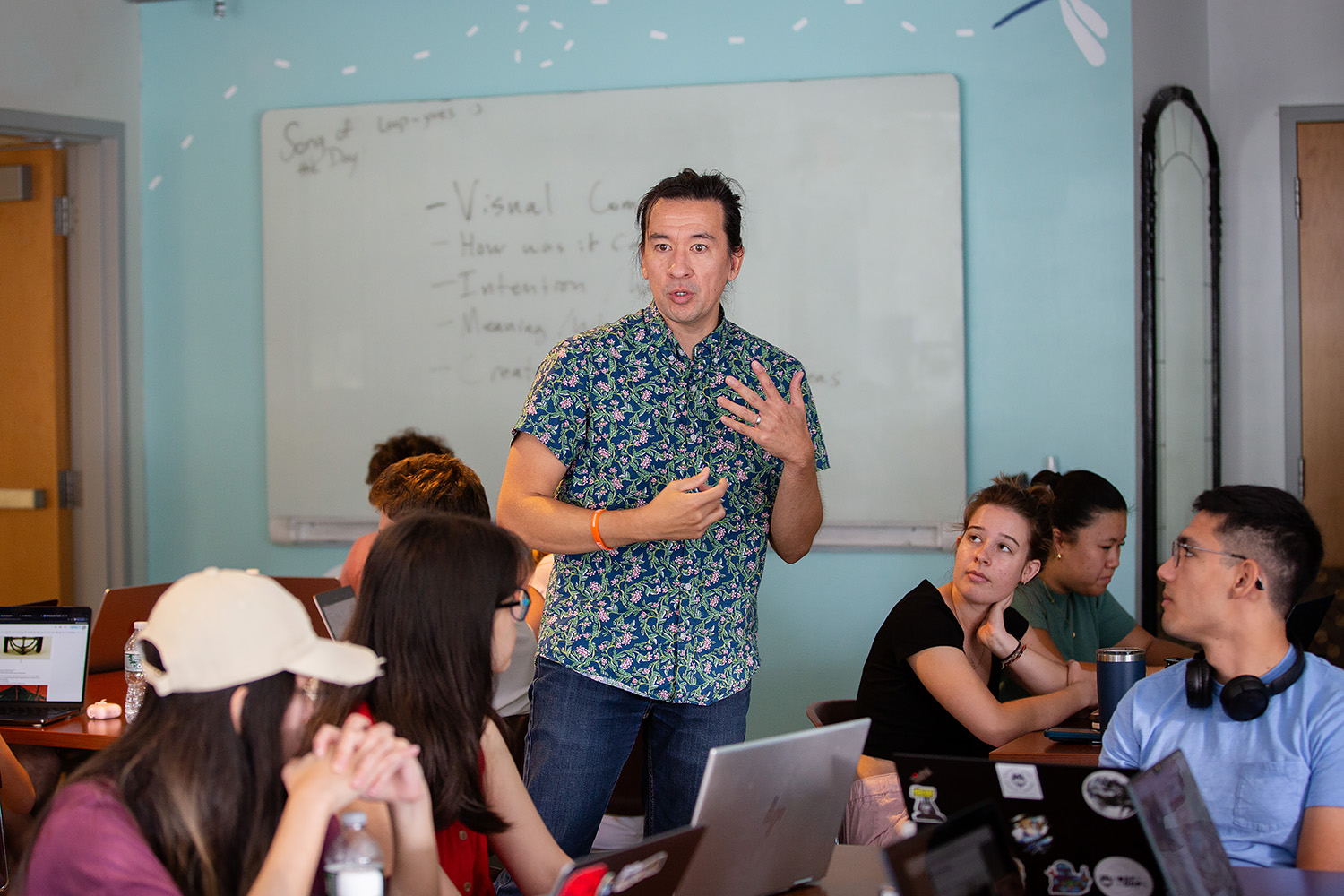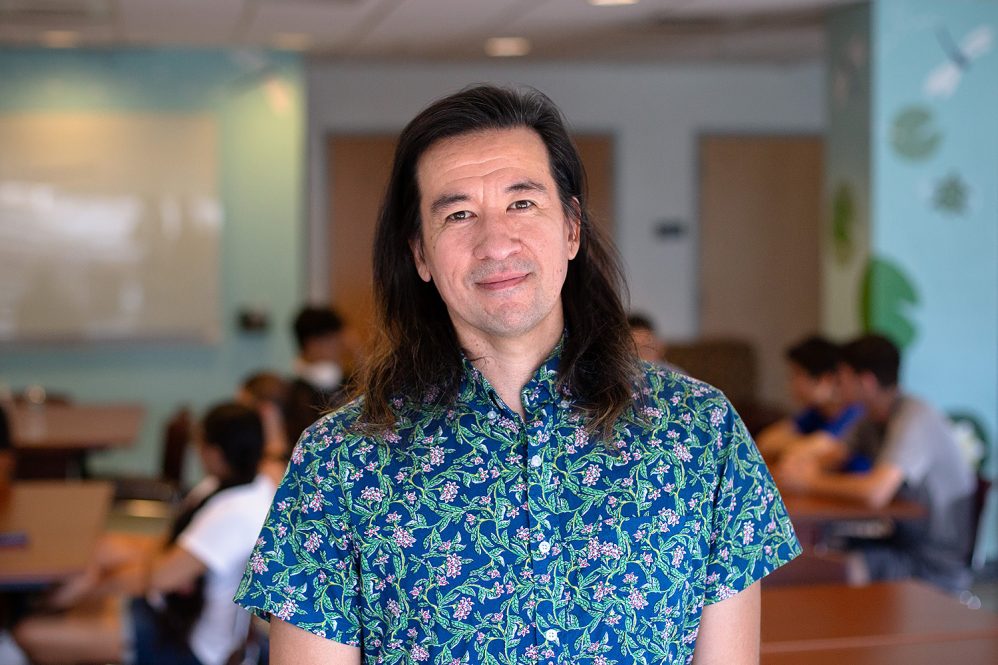How long have you been at UConn? How have things changed since you arrived?
I arrived in 2011, and for me, UConn has become more integrated. I’m now much more connected to other departments, colleagues, colleges, and campuses. I don’t know if it’s necessarily a culture change, but my experience at UConn started very much within the Department [of History] and the Institute [of Asian and Asian American Studies]. That was my world for a while, especially as I took on more leadership roles, directing the Institute. There’s an effort to make UConn more integrated among its constituent parts, which I think benefits everyone.
My experience started out small, though it felt big at the time. Now, there are just so many connections—a rich constellation of collaborators, supporters and community partners. That benefits both faculty and students.
Ultimately, it’s about having a public impact, which is where I see the emphasis of the new department: leveraging student experiences and faculty research so that the impact is not just on campus but in communities.
Your department is new to UConn. Can you tell us a bit about it and its purpose?
The new Department of Social and Critical Inquiry brings together four constituent areas: American Studies, Asian and Asian American Studies, Native American and Indigenous Studies, and Women’s, Gender, and Sexuality Studies. These four areas have been collaborating for several years to create a department that allows for growth and has the ability to hire and tenure our own faculty, providing stability.
Previously, as programs, institutes, and initiatives, we didn’t have the same security that a department offers. These programs exist because communities and students fought for them, and they fulfill an enduring need at the university. They are central to UConn’s equity mission, not just in representation but in academics and programming.
We are problem-based, solution-based academic units within the humanities, coming from intellectual traditions rooted in human struggle. Analyzing social conditions and critically reexamining assumptions and ideologies are crucial for transformation. Technologies and infrastructure may change, but if ideas and ideologies don’t change, we won’t see societal transformation. That’s why our departmental motto is “ Transformation takes social and critical inquiry.” These are the values our programs deliver through academic offerings and community partnerships.
Are there common misconceptions about studies in your areas? If so, what are they?
These areas of study have been attacked for bringing diverse and unconventional theories and ways of understanding the world, because they confront power structures and the status quo. These are enduring intellectual and scholarly traditions that come from justice movements, and they rarely receive the same institutional security as other departments or areas of study.
When defenders of white supremacy and misogyny, for instance, place a target on programs that build knowledge that has been erased or challenges the dominant paradigm, we see institutions dismantling these programs. However, UConn is showing an investment in these areas because of their necessity. This is not just something echoed by students or faculty; it’s valued by communities and endorsed by the Connecticut legislature. As a public institution, if we are committed to equity and inclusion, we must practice it in this way.
A central part of your work is community engagement. Why is that important?
In academics, we often talk about community engagement, but it’s not always well defined. What I’ve tried to emphasize is community partnerships. When we partner with communities, we achieve better knowledge, better education, and better outcomes. This department is really focused on that. It’s about trust-building and creating relationships with people, understanding their needs, and finding ways we can help meet those needs. Partnership is essential for transformation because community organizations are experts in the problems they face and vital to advancing any solution.
If we look at the university through a business model lens, we often treat students as the clients. But the broader community, the taxpayers of Connecticut, are also clients we serve – such as through the Curriculum Lab, Activist Residencies, and the Tribal Education Initiative. People don’t have to enroll in classes to benefit from UConn. We are partners in bottom-up change, educating the next generation of leaders.

Is it a goal to have an undergraduate major in social and critical inquiry?
Eventually, we want that. It’s worth pointing out, though, that our department is designed to be very different from others. As a department head, I’m accountable to a general council of the area directors, so we work together collaboratively. They tell me what they need to succeed, and I ensure coherence and provide administrative support to allow them to expand and grow.
Regarding degree programs, it’s important for each area to have autonomy over their programs within the department. We’ve already done some of that work, like the Social Justice Organizing major, which isn’t attached to any specific program, but we serve a lot of the classes for it. I’ve been the capstone instructor for that program for about five years. One of our top priorities is the development of a SCI curriculum with a major and graduate programs.
Your classes are also in high demand for students who are not majors or minors. Can you talk about why?
Ethnic studies and social and critical inquiry courses help students better understand the world and themselves. When students get that, they are better able to connect with the world, understand their own agency, and find enduring purpose. Students want to understand the world they live in. Students look to our courses to fill all kinds of requirements in other majors for this reason. Our units have produced very popular pop-up courses that grew from student demand and the community. These courses are the first introduction to our programs, but these pop-up courses are just scratching the surface of what our faculty can provide and are vital to students building personal connections with their academic programs.
It’s rare for students to see themselves and their communities represented in the curriculum, and that’s an important experience. SCI courses help them make an emotional, cultural, and personal connection to their education, which is crucial for understanding why it’s relevant to them.
Where do you see the department going in the next five years under your leadership?
I envision our department offering a transformative educational experience that connects students to communities and addresses important societal problems in Connecticut and beyond. I want our students to be equipped with the vision and tools needed to tackle the challenges they face. I see our faculty engaging in collaborative and innovative research that redefines scholarly productivity, demonstrating that community engagement and partnerships are not just supplements but are central to delivering public impact and conducting rigorous interdisciplinary research.
In five years, I would like to see us have Minority Serving Institution (MSI) grants at every campus. We already have Asian American and Native American Pacific Islander-Serving Institution (ANAPISI) status at Hartford and Hispanic-Serving Institution (HSI) status at Waterbury, but I want Storrs to have ANAPISI status, Avery Point to be a tribal-serving institution, and Stamford to be recognized as an MSI. These federally funded programs would support the belonging, performance improvement, retention, and graduation of students by aligning academic programs and support services with their diverse identities, ensuring they feel connected and empowered to shape their university experience.
What is your favorite place on campus?
I have several favorite places, and they are all spaces where UConn students have protested, stood up for themselves, envisioned a better world, and made meaningful contributions to the university. These spaces are special because students put everything on the line for their education and the benefit of everyone. If it weren’t for those actions, we wouldn’t have Asian American Studies. We wouldn’t have Women’s, Gender, and Sexuality Studies. We wouldn’t have Native American and Indigenous Studies.
Places like in front of the Student Union, where [UConn Professor Emeritus of Hydrology and Water Resources] Paul Bock did a hunger strike, which helped create Asian American Studies. And then, more recently, the student protests at the Dove Tower, and student protests for Black studies at Wilbur Cross and women’s studies at Gulley Hall. All these spaces, to me, are sacred spaces at UConn.
This Q&A is part of CLAS Visionary Voices, a series highlighting the College’s new academic leaders and their innovative visions for education, research, and outreach at UConn.



